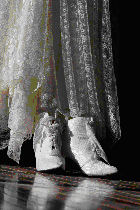|
During
the Q&A session
that concluded a recent speech, a workshop attendee asked if I believe
it’s important to live the scenes I write. By that
he wanted to know if I wear a fancy ball  gown
when writing about an
antebellum gala, or a Stetson and cowboy boots to write a
Western. My
answer (that I sometimes “act out” what characters are doing but not
while wearing period clothing) did not satisfy him, and it got me to
thinking about the go-to-work version of “you are what you eat.” gown
when writing about an
antebellum gala, or a Stetson and cowboy boots to write a
Western. My
answer (that I sometimes “act out” what characters are doing but not
while wearing period clothing) did not satisfy him, and it got me to
thinking about the go-to-work version of “you are what you eat.”
Whether you’re a full-time
writer or you put in a grueling forty hours before tackling your latest
WIP, you’re aware of the old Dress for Success rules: Well-groomed
hair, neat ’n’ tidy clothing, clean shoes, tasteful makeup and jewelry,
etc. The objective, say the experts, is to let your choices send
understated “what kind of worker I am” messages to coworkers, clients,
and bosses. Wear something pink and tell the working world that you’re
gentle and able to communicate, while black says you’re independent and
disciplined. (Stay away from the water cooler if you like orange,
because the color not only stimulates appetites, it stimulates
overactive conversation, too.)
Studies confirm that every
clothing choice we make sends subtle messages to ourselves,
too—messages that affect our emotions and, ultimately, shape our
performance—as well as interactions with coworkers, clients, and
bosses.
But what if, like me, you spend
95 percent of your working hours alone in a basement office, and your
only interaction is with a household pet? The dog doesn’t know the
difference between a sweat suit and a tux . . . and wouldn’t care if he
did. Ask a cat if she’d rather curl up on a lap blanketed by a plush
velour robe or a twill business suit, and she’d vote paws up on the
robe, every time. And the only clothes our characters care about are
those we force them to wear.
We
authors love to joke that two of the hundred or so reasons we love
doing what we do for a living is because we get to set our own hours,
and we get to stay in our PJs all day long if we want to. Which raises
the question: How does what I wear to work affect my job? I mean, if
appearance, emotions, and productivity go hand in hand, it stands to
reason that if I’m wearing a freshly laundered and pressed blouse and
crisp trousers when I roll up to my desk, the stuff I write will be
fresh and crisp, too.
Right?
Then
how are we to explain the
thousands of published authors who write entire chapters every day—several
days in a row when
|
on
deadline—garbed in ratty flannel PJs? Of the
dozens of writers I know well, only one daily coifs her hair, puts on
makeup and jewelry, and dons a legitimate outfit
before heading to her basement office. Granted, her output is
impressive, not only in word count but in quality of story. But I can
say the same thing about writer pals who write while wrapped in
tattered sweaters, high school jerseys, and “that shirt my dad used to
wear when  changing the oil in his pickup truck” changing the oil in his pickup truck”
It’s all about comfort, I told
the workshop attendee: If you’re physically comfortable in full Union
soldier regalia and believe it contributes to your
story somehow, by all means, button up that blue jacket! If a ball gown
or a Stetson or scuba mask is what it takes to blend authenticity into
your story? Go for it.
But if bunny slippers and a
holey sweatshirt help you accomplish the same thing, may the muse be
with you.
Happy writing, friends, and I’ll
see you at the costume shop!


|








 gown
when writing about an
antebellum gala, or a Stetson and cowboy boots to write a
Western. My
answer (that I sometimes “act out” what characters are doing but not
while wearing period clothing) did not satisfy him, and it got me to
thinking about the go-to-work version of “you are what you eat.”
gown
when writing about an
antebellum gala, or a Stetson and cowboy boots to write a
Western. My
answer (that I sometimes “act out” what characters are doing but not
while wearing period clothing) did not satisfy him, and it got me to
thinking about the go-to-work version of “you are what you eat.”  changing the oil in his pickup truck”
changing the oil in his pickup truck” 